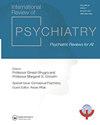Cross-cultural experiences and self-development: a psychobiographical study of Bruce Lee
IF 3.7
4区 医学
Q1 PSYCHIATRY
引用次数: 0
Abstract
A common challenge people face in today’s cross-cultural world is how to solve a series of adaptation problems caused by cultural conflict. Exploring Bruce Lee’s successful cross-cultural experiences through psychobiography offers some inspiration and thoughts. How did Bruce Lee successfully integrate martial arts, symbolising the Eastern culture, with films representing the Western culture, finally propelling kung fu films onto the international stage? Numerous publicly available materials about Bruce Lee were collected for this study, and the research data were evaluated using thematic analysis. Bruce Lee’s success benefitted from reconstructing cultural environment information and exercising his initiative to shape a new cultural environment. His life experiences reflect individual cognition behaviour and social and cultural environments as two aspects of a dynamic circulation system and show that the two have reached internal and spiralling harmony through mutual integration. In the context of the Oriental collectivism culture’s family narrative, Chinese adults’ personality development features the unique theme of ‘inheritance and innovation’. Dealing with the relationship between self-actualisation and familism is another important and challenging task in developing the Chinese personality.跨文化体验与自我发展:李小龙的心理传记研究
如何解决文化冲突带来的一系列适应问题,是当今跨文化世界中人们共同面临的挑战。通过心理传记研究李小龙成功的跨文化经历,可以给我们一些启发和思考。李小龙是如何成功地将象征东方文化的武术与代表西方文化的电影相结合,最终将功夫片推向国际舞台的?本研究收集了大量关于李小龙的公开资料,并使用主题分析对研究数据进行评估。李小龙的成功得益于他对文化环境信息的重构,以及他塑造新文化环境的主动性。他的人生经历反映了个体的认知行为和社会文化环境作为一个动态循环系统的两个方面,表明两者在相互整合中达到了内在的螺旋式和谐。在东方集体主义文化的家庭叙事背景下,中国成年人的人格发展具有“继承与创新”的独特主题。处理自我实现与家庭主义的关系是中国人人格发展的另一项重要而富有挑战性的任务。
本文章由计算机程序翻译,如有差异,请以英文原文为准。
求助全文
约1分钟内获得全文
求助全文
来源期刊

International Review of Psychiatry
PSYCHIATRY-
CiteScore
5.10
自引率
0.00%
发文量
85
期刊介绍:
The International Review of Psychiatry is the premier review journal in the field with a truly international authorship and readership. Each bimonthly issue is dedicated to a specific theme relevant to psychiatry, edited by recognized experts on the topic, who are selected by the Editors and the Editorial Board. Each issue provides in-depth, scholarly reviews of the topic in focus. The Journal reaches a broad international readership including clinicians, academics, educators, and researchers who wish to remain up-to-date with recent and rapid developments in various fields of psychiatry. It aims to be of value to trainees by choosing topics of relevance to career development, which are also suitable for clinicians for continuing professional development.
 求助内容:
求助内容: 应助结果提醒方式:
应助结果提醒方式:


